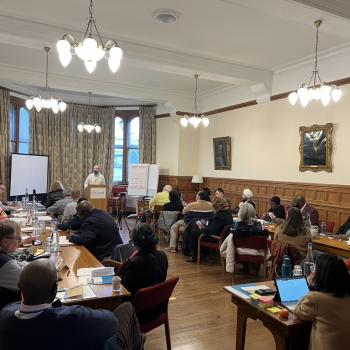This post is unusual, so a little introduction is in order: Below is the manuscript version of a talk I gave recently at the Parliament of World Religions in Chicago. I was one of four panelists focusing on important figures who are known for bringing others together under spiritual banners. Hosted by the delightful Ibrahim Anli of the Rumi Forum, my co-presenters and I each selected a religious figure. Here’s the list:
- Pope Francis: Fr. Don Rooney of St. Bernadette’s Parish, Arlington, Virginia.
- Reb Zalman Schachter-Shalomi: Rabbi Morris Zimbalist, Senior Rabbi of Congregation Beth Judea in Long Grove, Illinois.
- Fethullah Gülen: Professor Ori Soltes of Georgetown University, Washington, DC.
My subject was Dietrich Bonheoffer. Due to time constraints at the Parliament, I had to leave out considerable portions of what you’ll find here in the complete version. I don’t know if the event planners will post a video of our panel session. If you’re interested, keep checking the website.
Toward a Bonhoeffer-Inspired Embrace of the Other

A Talk Delivered by Dr. Rob Schenck at a Breakout Session of the Parliament of World Religions, Chicago, August 15, 2023
I want to thank the Parliament for this opportunity, Director Anli for your kind invitation and introduction, and each of you for your interest in this critical and timely topic, Toward a Bonhoeffer-Inspired Embrace of the Other.
I’m thrilled to talk about the extraordinary man I like to call my posthumous mentor and best dead friend, Dietrich Bonhoeffer—especially in this context of Embracing the Other in Unwelcoming Times.
Today, though, I must include a caveat: Until recently, for me, Bonhoeffer could do no wrong; he was literally the perfect exemplar of ethical religious leadership. But after studying his life closely over the last dozen years and talking to much better-informed colleagues about the real Bonhoeffer, compared to the mythical one, I’m a bit sobered and slightly more realistic in my assessment of the man. He was, after all, a creature of his time and cultural context.
Having said that, and notwithstanding his shortcomings, some of which I share with him—and maybe you do, too–I hope to persuade you that his life, his ideas, and his model of courage can be of enormous help to us, particularly when it comes to embracing the Other.
A Bonhoeffer Biographical Sketch
Now, I imagine many of you know quite a bit about Dietrich Bonhoeffer, but in case you don’t, allow me this precis of his life and legacy:
Born in 1906, Dietrich was the 6th of 8 children; his mother was a certified schoolteacher, and his father was a noted psychiatrist and professor. Theirs was an upper-class, privileged household, maintained mainly in the tony Grunewald neighborhood of 1920s Berlin. Though not a terribly religious family, Dietrich, at age 14, precociously announced he intended to study theology, much to the pleasure of his mother, Paula, but to the chagrin of his agnostic father, Karl.
Once in University, though, Dietrich pursued his discipline passionately, leading eventually to the venerable Karl Barth declaring Bonhoeffer’s first dissertation, Sanctorum Communio, a “theological miracle.” From there, the young scholar began a meteoric trajectory in the academy. At the same time, he followed a more usual course in the church as a cleric—until 1933. That’s when he took great offense at Hitler’s Aryan Paragraph, banning anyone with Jewish blood from holding federal government jobs, including as pastors in the established Evangelishe Kirche.
From then on, Bonhoeffer would become a more and more ardent Nazi resister. He was eventually imprisoned, tortured, and, in April 1945, executed at the Flossenburg concentration camp. Bonhoeffer left behind a trove of writings on theology, ethics, and human relations, which were meticulously curated by his confidant, Eberhard Bethge, and are now published in the multi-volume German and English editions of the Dietrich Bonhoeffer Works.
Dietrich As A Mixed Bag
As I indicated, Dietrich is a bit of a mixed bag for our noble theme. His privileged, semi-aristocratic, highly educated, and ethnocentric formation left him with a certain deficit in this area. His world was white, European, and of uniform socio-economic status. He also exhibited a hint of German nationalist impulses–and, maybe, a residual, unconscious anti-Semitism(?).
Still, even as a teenager, Dietrich was curious about other religions and cultures. At 18, he traveled to Rome, Sicily, and North Africa, gushing in letters home about the interesting people and customs he encountered. Later, he engaged in vigorous ecumenical exercises throughout his career. Of course, the latter was exclusively Christian, but an early 20th-century German Lutheran reaching beyond his provincial boundaries was somewhat radical. Moreover, Dietrich’s interest in the Catholic Church was tantamount to following after the Antichrist. So, by nature, he was rather daring and subversive regarding religious norms.
Then came 1933, and with it, Nazi Party control, extreme legislative measures restricting speech, the granting of dictatorial powers to Adolf Hitler, and that law banning pastors with Jewish blood. Bonhoeffer strenuously objected to the action–but narrowly. As he saw it, the offense was the expulsion of converted Jews, clergy with Jewish backgrounds whose baptism made them members of the Christian populace. So, there’s that problem, and it’s a big one, especially in Jewish-Christian relations, and has wider implications.
In preparation for today, I spoke with Bonhoeffer scholar and translator Vicki Barnett, who has done extensive work on that period as a German church historian and expert on the church’s role in the Holocaust. She’s doing new work on this element in Bonhoeffer, vis-a-vis his disposition toward the treatment of Jews in Nazi Germany. She thinks he approached this problem as a limited civil rights issue, not a distinctly universal religious or theological one.
Regardless, Bonhoeffer embarked on a progressively more and more empathetic path on “the Jewish question,” as he frames it in his famous essay by that title. He will, eventually, help with a project to convey several Jews out of the country safely. And, it is, in part, what he learns from another brother-in-law, Hans von Dananyi, about the scale of persecution, murder, and seeds of Jewish genocide, that propels him into the “risky venture” of the conspiracy to assassinate Hitler. Which, of course, seals his fate.
Bonhoeffer Can Help, In Spite Of Faults
Notwithstanding this complexity, I want to point to a few things about Bonhoeffer that can help inform and inspire interreligious embrace today.
First, it goes without saying that the backdrop to Bonhoeffer’s life and work was one of the most unwelcoming, hostile, and anti-human periods in global history. Add to that the contemporaneous European conventions of patriarchy, misogyny, elitism, and extreme nationalism, and you have a really toxic environment, even outside of the Third Reich. Meanwhile, in the United States, immigration officials refused entry to Jewish refugees—and, of course, American Blacks, including veterans who fought against the Nazis, were denied their civil rights, human dignity, and even their lives when lynched or otherwise brutally murdered.
It’s in this setting Bonhoeffer accepts a post-doctoral fellowship at Union Theological Seminary in New York. While there, he visits Abyssinian Baptist Church in Harlem at the invitation of his close colleague, Frank Fisher, one of only two African American fellows at Union. Abyssinian is a center of Black life and activism in 1930s America.
Not only does this blond-haired, blue-eyed Teuton embrace the community at Abysinnian, but after a cross-country road trip that takes him through the ferociously segregated South, he declares that the only place in America one can hear the true Christian message preached with integrity is in the “Negro churches.” — his observation of how Black church leaders suffer with their people eventually thrusts him back to Germany to suffer with his compatriots, including Jews, Roma, homosexuals, and political dissidents.
Key Element In Bonhoeffer’s Thought
Here is a good place to note a crucial concept in Bonhoeffer’s thinking: Stellvertretung–or “vicarious representative action.” In his posthumous magnum opus, Ethics, he writes, “The commandments of God’s righteousness are fulfilled in vicarious representative action, which means in concrete, responsible action of love for all human beings.”
Bonhoeffer scholar and my good colleague, Stephen Haynes, professor of religious studies at Tennessee’s Rhodes College, explains,” ‘Stellvertretung,'” most simply, is Bonhoeffer’s description of how human beings are to be in the world. As Christ lived and died vicariously, his disciples are called to vicarious action and responsible love on behalf of the Other.”
I think this element of Bonhohoefferian ethics translates perfectly into the inter-faith encounter.
VICARIOUS ACTION is expressed in, say, concrete Christian advocacy and protection for Muslims who wish to build a mosque or of, Sikhs who have been attacked at their Temple, or Jews who are menaced by neo-Nazis and KKKers carrying Tikki lamps.
RESPONSIBLE LOVE is demonstrated in the affirmation of every religious adherent’s human rights, a humble appreciation for what the other may know that the Christian doesn’t or can’t know, or a celebration of what the Christian and the Other share in common–even if it’s mutual respect of differences. All of this, I would argue, extends from Bonhoeffer’s Stellvertretung.
Whether you see Bonhoeffer and his interfaith engagement as deficiently limited or see it more expansively, there is something to what Austin Presbyterian Seminary professor David Jensen observes in a 2001 Journal of Ecumenical Studies article, in which he writes:
“The interfaith promise of Bonhoeffer’s theology lies precisely in this recognition: Only when we allow ourselves to become vulnerable to others are we capable of relationship and opened to others’ vulnerability. Witnessed dramatically in Bonhoeffer’s own life, the consequences of this cruciform interpretation of discipleship are visible: away from a secure interpretation of Christianity that saw Jews as a threatening ‘other’ to be converted, toward an envisagement of worldly discipleship in a polyglot setting, resulting in risky action on behalf of Jews forced to wear the yellow star.”
Only The Real Bonhoeffer Can Help Us
To Vicki Barnett’s point, fully appreciating Bonhoeffer’s contribution to embracing the other requires we dispel the myths surrounding him. He struggled as we do–with implicit biases, a sense of entitlement, the urge for self-justification, and, perhaps, the notion of one’s own superiority. (Perhaps a lesson here is if he could do it with all his flaws, you and I can certainly do it.)
Dr. Barnett cautions in a 2015 Washington Post OpEd, “We cannot understand his wartime and prison writings if we see only the heroic Bonhoeffer. ‘We have been silent witnesses of evil deeds…are we still of any use?’ he wrote fellow conspirators in December 1942. About the profound failures of his church under Nazism, he charged that it had fought ‘only for its own self-preservation,’ thereby losing the very capacity to bring ‘reconciliation and redemption to humankind and to the world.'”
If Dietrich Can Do It, So Can You And I
Maybe Dietrich Bonhoeffer did all he did for the Other within the constrictions of his privilege–or perhaps he did it after abandoning those strictures; maybe he did it as much out of self-interest as he did it for the benefit of others, but, as I see it, he did it. He reached beyond himself—always an epic human odyssey– and embraced the Other.
Summing It Up
Given Bonhoeffer’s broad appeal, how he brings liberals and conservatives together, how he is admired by secularists and even atheists–given his unquestioned commitment to a profoundly spiritual humanism, and the extreme circumstances surrounding his religious and cultural generosity, Dietrich Bonhoeffer remains an important model, even if an imperfect one (but who isn’t?)–and he remains a unique inspiration for reaching out to and embracing the Other in unwelcoming times–even in supremely unwelcoming times—and in quite costly ways.
Thank you.














